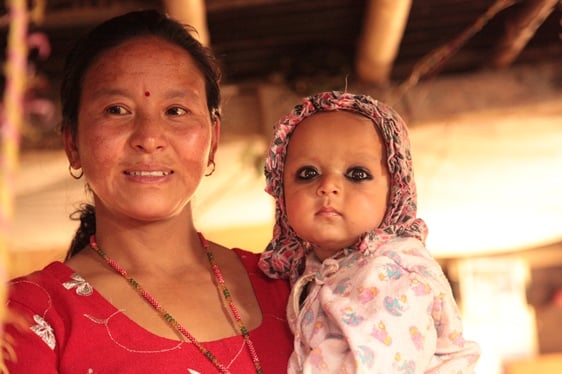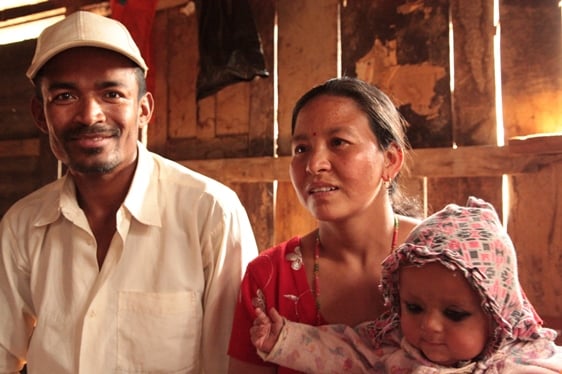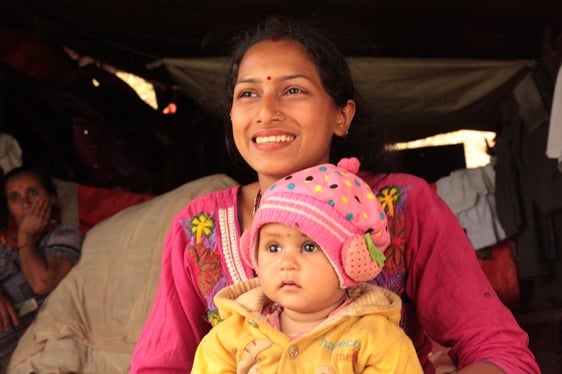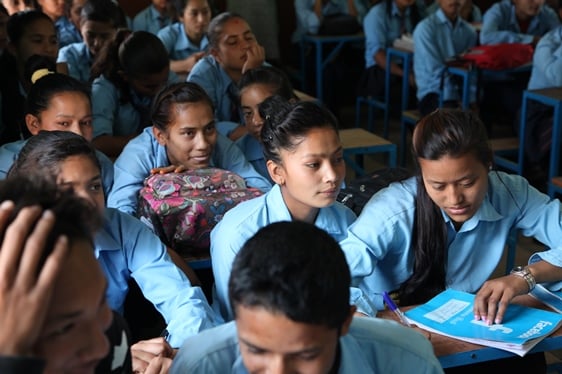Nuwakot, Nepal - One year on from Nepal’s deadly earthquake, Ishwori Dangol (30) has brought new life and new hope to her family.
Despite still living in a shelter, Dangol and her husband are looking forward, planning how best to provide for their baby, born amid the aftermath of the disaster.
Back in April 2015, the huge earthquake brought down their home, killing their seven-year-old son inside.
“When we found him, my husband couldn’t bear the sight of it. He almost fainted,” she says.
“We took him out of the rubble, then I felt a pain in my stomach. I was scared something would happen to my baby through stress.”
Seven months pregnant, in increasing pain and afraid she would miscarry, Dangol didn’t know where to turn.
“The local hospital was destroyed, so I didn’t know where to go for a checkup. I was feeling very scared,” she recalls.
Soon after, a community volunteer told her that a reproductive health camp was being set up nearby through the United Nations Population Fund (UNFPA), to offer key health services to pregnant women and new mothers.
Dangol headed for the camp, where she underwent vital tests.

“After the ultrasound, the doctor told me that my baby was upside down, but that I didn’t need to worry as it could be righted later,” she says.
She was referred to the Trishuli Hospital, the biggest health facility in the district that was only partly damaged by the quake, and her baby boy was born safely on July 10.
“If I didn’t visit the camp, and if I wasn’t told to go to the hospital for a cesarean section, I don’t know what would have happened to my baby,” Dangol says.
“The advice I got at the camp also helped me to cope while I was pregnant and after giving birth,” she adds.

In the 14 hardest-hit districts some 93,000 pregnant women were affected and nearly 85% of all health facilities were damaged or destroyed.
Like Dangol, thousands of pregnant women faced grave risks through giving birth in dire conditions, without critical, lifesaving care.
“In total we ran 132 reproductive health camps in the most affected areas,” explains Kristine Blokhus, UNFPA’s Deputy Representative in Nepal.
“Through these, we met a lot of immediate needs – providing services to over 104,000 people, over 90% of whom were women and girls,” she says.
UNFPA also rehabilitated 80 birthing facilities, and helped set up 14 transition homes, in which “over a thousand pregnant women and new mothers took refuge,” says UNFPA’s Blokhus.
Sabita Acharya (18) also found support at a UNFPA reproductive health camp in Nuwakot.
“Staff from the camp gave me a pack with clothes and everything – soap, a gown, a petticoat and an umbrella,” she says.

Over 56,000 of UNFPA’s trademark Dignity Kits were given out to women and girls in earthquake affected areas.
Besides clothes, the packs contain reusable sanitary napkins, towels, washing materials and a torch.
“With a change of clothes and the ability to keep clean, women feel more confident when they go out to get aid, or when they work to rebuild their lives and communities,” says Giulia Vallese, UNFPA’s Representative in Nepal.
“With a torch, they feel safer if they go out at night.”
“One of our main aims is to make sure that women and girls are not forgotten in emergencies, and to uphold their dignity at all times," Vallese continues.
"Going forward, it’s absolutely critical that women and girls get the information and services they need when it comes to family planning and sexual and reproductive health, and that they are considered to be agents of change.”

Back out in Nuwakot, the Dangols are working hard, saving up to build a new home.
“There are lots of families that faced the same sort of challenges as us. They give us strength,” says Ishwori.
“Though we lost one son, we’re blessed with another. We’re happy for that.”


